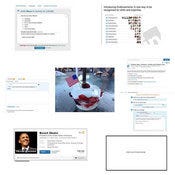5 Ways To Ace Phone Interviews5 Ways To Ace Phone Interviews
Spend all your time preparing for the face-to-face interview and you may not move past the phone interview step.


8 LinkedIn Etiquette Mistakes
8 LinkedIn Etiquette Mistakes(click image for larger view and for slideshow)
Your phone interview stands between you and the new job you really want. Present yourself badly, and you won't get the chance to make an impression in person. Yet many people do not start phone interviews ready to win, said Gianna Scorsone, chief of staff at recruiting firm Mondo.
"Ninety-five percent of the time an interview is going to start with a phone screen, and very few people prepare for it," Scorsone said. "Hiring managers are looking to make sure that not only do your skills fit, but that your personality is a good fit for their company, too. That's the crucial part -- they're deciding whether it's worthwhile or not to bring you in for a face-to-face interview."
Navigating a phone interview has its challenges: You don't have the luxury of reading facial expressions to gauge how well the conversation is going. Without the face-to-face interaction, it's also more difficult to determine whether you're answering the hiring manager's questions as expected, Scorsone said. But as awkward and uncertain as phone interviews can feel, you can take steps to make sure you nail it.
[ It's a good idea to refresh your LinkedIn profile once a month. Read more: LinkedIn Tips: 5 Ways to Strengthen Your Profile. ]
1. Research Talking Points
Your first step should be to research both the company and the interviewer.
"Research the company and their trigger events, or what's going on in their world," Scorsone said. "Know … any new products they've launched recently. And with social media so prevalent, you'd be crazy not to do some research on the person who's interviewing you. Go to LinkedIn and look at their accomplishments and try to find something you can relate to and create a common bond."
2. Turn The Interview Into A Conversation
Your goal during the phone interview is to create a connection with your interviewer, and the best way to do that is to turn the interview into more of a conversation, Scorsone said.
"After you've done your research, make a list of your talking points. You don't have to keep the question-and-answer format where the interviewer is asking all the questions and you're doing all the answering," she said. "Flip it so you're asking them some questions. That's one way to transform a sterile interview into a friendly conversation."
Making the interview more conversational gives you an opportunity to better showcase your personality, Scorsone said. Remember that the interviewer wants to determine whether you'll fit in with the team.
3. Tell Stories
One of the most common mistakes job candidates make during a phone interview is using what Scorsone calls "blank statements," such as describing yourself as a "hard worker" or "very knowledgeable with Microsoft technologies." Instead, you need to show the interviewer how you're a hard worker or why you're knowledgeable about Microsoft technologies. "When you just say you're good at something, you're leaving it up to the interviewer to believe you or not," she said. "But when you tell them a story where you're showing why you're good at something, you leave the interviewer no choice other than to arrive at that conclusion themselves."
Another tip: Scorsone recommends reviewing the job description and making a list of the characteristics and skills that the ideal candidate would have. Then think of experiences you've had that embody those skills or characteristics and write down examples that you can use in the interview.
4. Prepare Your Surroundings
Before the interview, make sure your surroundings are conducive to talking privately and won't pose distractions. If possible, use a landline to prevent the hassle of mobile phone calls dropping, and be sure you have a hard copy of your resume on hand in case you need to jog your memory.
5. Follow Up
Whether you send a thank-you note will make or break your interview, Scorsone says. Resist sending a typical boilerplate thank-you note, too. Make it personal.
"Make your thank-you note stand out by referencing something about the conversation you just had, such as something you learned about the company. This makes the interviewer relive the conversation they just had and will remind them of how impressive you were," she said.
If you were asked a question that you didn't answer to the best of your ability, the thank-you note is a good place to address that. "You can say, 'I was so excited about our conversation and I realized I didn't answer that question as best as I could,'" Scorsone said. "This is a good way to show them how passionate you are about that topic and the position."
Make sure you're prompt in sending the note, Scorsone advised. Try to message the person within the first two hours of the interview. Following up with a hand-written letter can't hurt, either: Keep it simple and reiterate your passion for the role and your excitement to meet the interviewer face-to-face.
About the Author
You May Also Like






